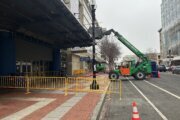Virtual learning can be challenging for families and educators, and while some D.C. area parents have hired teachers to come in and tutor small groups of students, one Black educator worries about families who can’t afford it.
When Natalie Thomas saw “pods” forming — groups generated by parents who paid tutors or teachers to assist small groups of students in their homes — she grew concerned for children, particularly Black children, whose parents couldn’t afford that kind of support.
“Pods — I do believe — do widen the gaps between the haves and the have-nots,” said Thomas. “Parents cannot pay — starting at $60 an hour — for a tutor to help their child to get the work they should have been getting virtually.”
Thomas, who is Black and previously worked in Maryland’s Montgomery County Public Schools and currently works at Towson University’s Shady Grove campus in the teacher preparation program, said that is when she decided to form Advancing Black Lives in Education (ABLE).
The group is in its infancy. Thomas, who has been talking to parents along with current and retired Montgomery County Public Schools teachers, said she is convinced there is a need for some kind of organized resource tailored to Black families.
Thomas said there are groups like Identity, a Maryland nonprofit that offers academic support to Latino students along with a range of other services, and believes something similar is needed for Black families in Montgomery County.
Montgomery County Public Schools has been working to combat an achievement gap that sees Black and Latino students lag academically compared to their white and Asian peers.
A report by the county’s Office of Legislative Oversight in December of 2019 found that despite efforts going back for over a decade, the school system’s attempts to close the gap had been “ineffective” overall, despite gains in Algebra I and math.
Montgomery County Public Schools Superintendent Dr. Jack Smith acknowledged the continuing achievement gap in an op-ed published in The Washington Post in May of 2019. But Smith pushed back against some of the Office of Legislative Oversight findings in his response to its report.
Smith referred to the “All In: Equity and Achievement Framework” that examined student achievement that he said “drives the system’s equity work to increased levels” in a way that previous reporting did not.
While families and teachers do what they can to keep students engaged and prevent learning loss as virtual education continues, Thomas said, “We need to be able to go in and work with kids, and teach kids and make sure that they are OK.”
And as the group hones in on just how to achieve its goals, Thomas added: “We’re giving parents suggestions on how to keep the children engaged and how to break up the learning tasks.”








